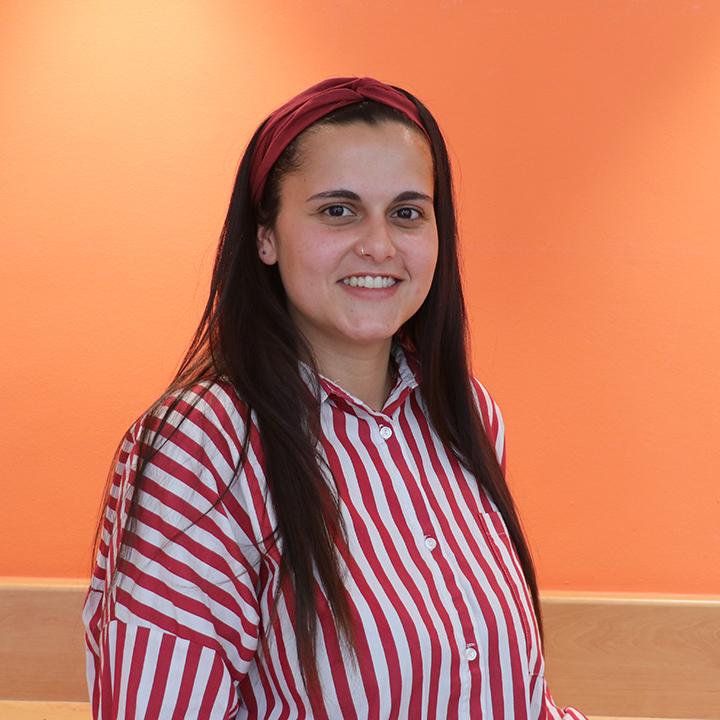ELISABET TORRENTS. Suara Cooperativa Member
Hearing Elisabet speak of her illness is to be in front of someone who, despite recognizing the harshness of the word cancer, has wanted to vindicate it from the beginning, in order to accept this challenge of life with positivity and optimism. Elisabet, director of the Els Picarols nursery school, in Manlleu, has decided at all times how to live and coexist with the disease, and thanks to the Guide to Accompany People Sick with Cancer of Suara, she has also been able to do so in her work environment. Cancer, as Elisabet explains well, is a disease that changes your life and that, beyond the limitations it implies, causes a great physical, emotional and social impact on the person. Accompaniment adapted to each case, each illness and the needs of each one is essential so that, if the person wishes so, return to work is possible. Do you want to know her life story?
How many years have you been the director of the Els Picarols nursery school?
This course 10 years, and we will celebrate it in October! When I arrived in Suara I started as the director of the Les Caliues nursery school, but I had always asked the Cooperative to come closer to my territory to be closer to home. Then we won the project for Els Picarols nursery school in Manlleu, and that's when I was able to make the change.
You were born in the town of Masies de Voltregà, in the Osona region.
Yes, and I haven't moved from there! My parents had a country house, in a totally rural environment, and when I got married I moved from one end of the municipality to the other. I have always been very happy and very proud of the childhood I had. We had the house rented and we didn't keep it, but I have very good memories of that time and of all the stories lived in freedom and with nature. My children have also lived in the village since they were born, and they really like living under the tranquility of this environment.
The nursery school where you work has the Green School badge. What does this mean?
It means that within the school we undertake activities that contribute to benefit our environment and our planet, such as having a garden, recycling with the children, or using more natural and respectful materials. We serve children from four months to three years old, but no matter how young children are, they too can show respect for the environment. In kindergarten we want parents to get involved and participate, since the main educators are them, and what we do is share this education. There must be continuity and a bond between the school and the family, and that is why we always say that we want it to be a close school, socially responsible and respectful of the way of being and doing of each family.
These values are also very present in the Cooperative.
Yes, so from the beginning I was very clear that I wanted to become a member. I love Suara very much, for giving me the opportunity to have a job and for the growth that it has brought me professionally and personally. I am very grateful, and I feel that I am Suara, I am part of it, not only work. I consider that it has great values, and I have lived them in the first person, especially in recent times due to the illness I have suffered. In Suara there is a lot of talk about the value of people, but when you live it in your own skin and see that it is real, that you have not touched and you have lived it, you feel great satisfaction. And I have felt this accompaniment when I have had cancer.
I guess it was not easy to receive the news.
The truth is, no. I went for a routine gynecological check-up, and I went looking for the results with all the peace of mind in the world. But instead of the typical small envelope they gave me a very large one, and at that moment my nerves took hold. I opened the envelope and when I read the report I did not understand anything, but I already saw that something was not right. The gynecologist told me that it was possible that there was cancer, although they could not assure me until the pertinent tests were done. The firm diagnosis confirmed that it was breast cancer, and that it was bad. And when I asked the doctor if I could be cured of this cancer, his answer was forceful: "yes, but we have to go fast".
Did you decide to explain it to your poeple?
Living in a village I decided to say it before people started talking. And I did the same with family and friends. One of the hard moments was explaining it to the team. You see people's faces and their reactions the day after they said it. You live with someone for so long and experience so many things in a school that it was a brutal shock, especially since the word cancer is heavy and hard to pronounce. Saying it has helped me a lot, because it made me aware that I had it. Explaining to my children that I was ill was also very painful, because it was already the third cancer in the family. I remember that I told my partner from the first moment that I did not want to hear phrases such as "why did it happen to us?" Cancer had come into our lives and we had to face it however it was. It was one more challenge in life and we had to face it in the same way as the other problems that we had encountered along the way.
And then the Guide to Accompany People Sick with Cancer appeared.
I was on sick leave, undergoing chemotherapy, when the Cooperative called me to inform me that this guide was being prepared. They wanted me to participate in the process, and although in the first sessions I could not go because my body could not make many efforts, I joined at the end and I really liked being able to take part and participate in what I was experiencing. That is why I always say that the Guide was born with me, because I was immersed in the entire cancer process and I was able to participate both in its preparation and in the experience of accompanying it.
How was that accompaniment?
The support that I received from my team and my manager was wonderful, and I think I will never have enough words to thank what these people have done for me. After the operation I started chemotherapy treatment, and then radiotherapy. And once I was done, I thought that in a short time I would recover and go back to work. But then you see that the weeks go by and this recovery is slower than you imagined, and you start to think about what they will say at work if you don't rejoin soon. The luck I had is that at all times they understood that each case and each cancer is different, they respected who wanted to communicate it and how, and this accompaniment reassured me a lot and allowed me to make a progressive reintegration, adapted to my needs. It distressed me a lot to rejoin, and thanks to this way of doing, which was born from Suara and the guide, I was able to calm my fears and choose how to live the disease at all times.
What actions does the guide include?
The guide should be adapted to the job and the person's situation. Maybe I need to do a reduction in working hours or online meetings because I can't get around, and maybe someone else needs different accommodations. It is not about what measures are made, but how these are adapted in the workplace and the needs of each person. In my case, I did not see myself capable of working full time, because my body was not prepared to withstand it, and so my manager proposed to me to compact the holidays and start with a shorter schedule, as well as to do a co-management with another colleague from the school. That day I took a load off my shoulders, the room was filled with light! After compacting on vacation, I decided to continue with the reduction in working hours, because my body still needed it. And I have continued like this until now. Looking forward to the next course, I am already joining full-time with an adaptation to a schedule that I think will be good for me, and I am very eager and excited to start.
What if this guide didn't exist?
If this accompaniment had not been done, I would probably have started working full time and after a few months I would have taken a leave of absence because my body would not have kept up. He would have had to assess whether or not to continue working, and he would have lived cancer in a different way, with much more anguish and more fear. Sometimes people have asked me if I have ever considered stopping work, and the truth is that I have not, because I like my work a lot. But my reflection is that if this guide had not existed, I probably would have had to stop working or look for another job. In this way we have found the balance, and the tasks that correspond to my job have not stopped being done, they have simply been done by someone else or I have done them differently. It is clear that it is not easy to do this adaptation, but my example, what I have lived, can show that this way of doing it is possible.
Unfortunately, this is not the reality for everyone.
It is very sad that this guide is not a normality everywhere, so that companies, cooperatives and entities, first of all, are made up of people. Value is not the activity that that company does, value is the people who make it up, and all companies should be able to do this support. Not only in the vital process of cancer, if not in all the processes that we have to live and that are hard. I believe that this guide can also help to accompany people with other vital processes, and become a tool for people who have not had the disease to become aware that cancer causes a very great physical, emotional and social impact on person.
Has cancer changed your life?
Cancer has brought me very bad and very hard things that no one will take away from me, but it has also brought me many good things. Elisabet from before is not there, and now there is another Elisabet, and you have to accept how life has brought you illness and the limitations that this implies. I have always been a very active and positive person, who thinks that problems are opportunities, and if I lived in the moment before, now I still live more. We all know that we have to die one day, but we are not aware, and we always think that cancer will touch others. And the truth is that you do not choose how to face cancer, but the mere fact of living it already makes you a fighting person. Each cancer is different and each person experiences it differently because each person is different, and hence the success of this guide, which adapts to the way of being and living cancer of each one. My dream is that all people with cancer can have the support that I have had.





